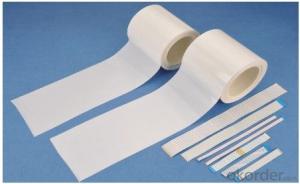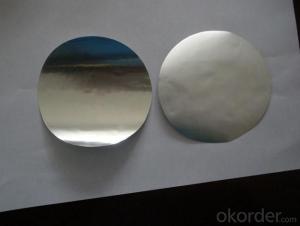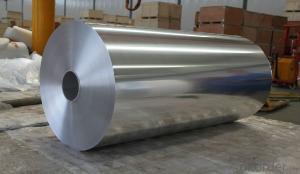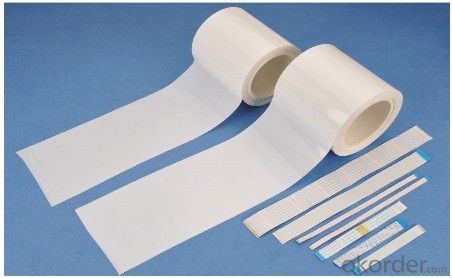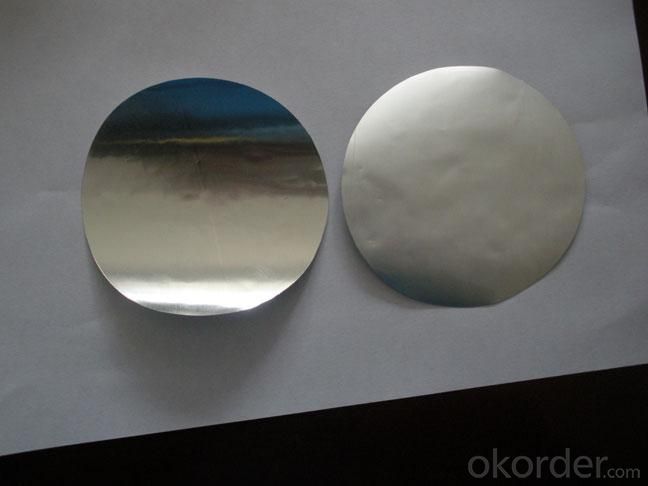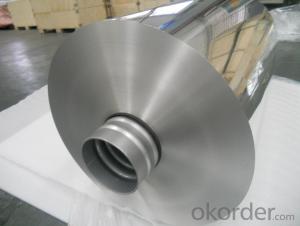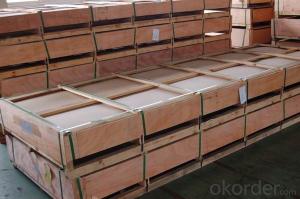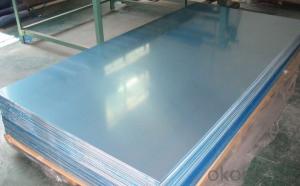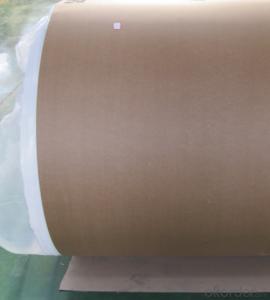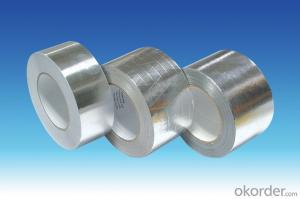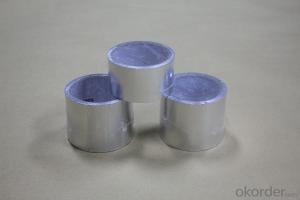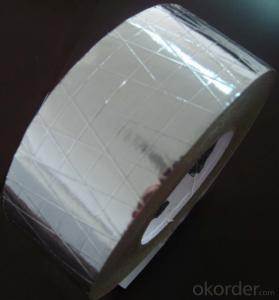Aluminum Foil Tape HAVC Solvent Insulation Self Adhesive Repair Roofing
- Loading Port:
- Shanghai
- Payment Terms:
- TT OR LC
- Min Order Qty:
- 5 m.t.
- Supply Capability:
- 9000 m.t./month
OKorder Service Pledge
OKorder Financial Service
You Might Also Like
Specification
High Quality HAVC Solvent Insulation Self Adhesive Repair Roofing Aluminum Foil Tape
Description
Aluminium tape is suitable for repairs on metallic surfaces such as car body work,
roof and gutter repairs and even insulating pipes. Suitable for applications indoors and outdoors,
it provides a general purpose temperature insulation and is also suitable for sealing of ducts, masking, protecting, repairing and closing.
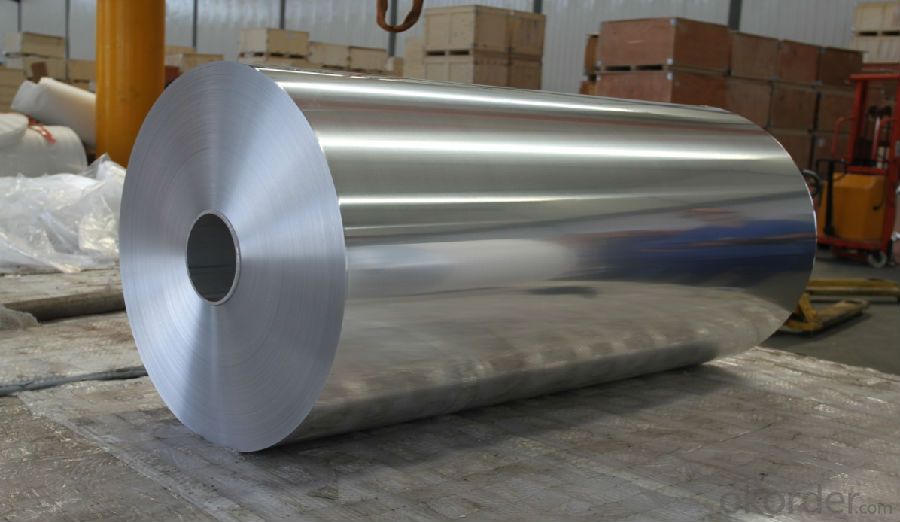
Technical Specification:
• Aluminum backing provides excellent reflection of both heat and light.
• High quality adhesive with strong adhesion and holding power offers permanent sealing and bonding on Foil-Scrim-Kraft Facing joints and seams in HVAC ductwork application.
• Good aging resistance both indoors and outdoors.
• Low moisture vapor transmission rate offers excellent sealing and patching performance
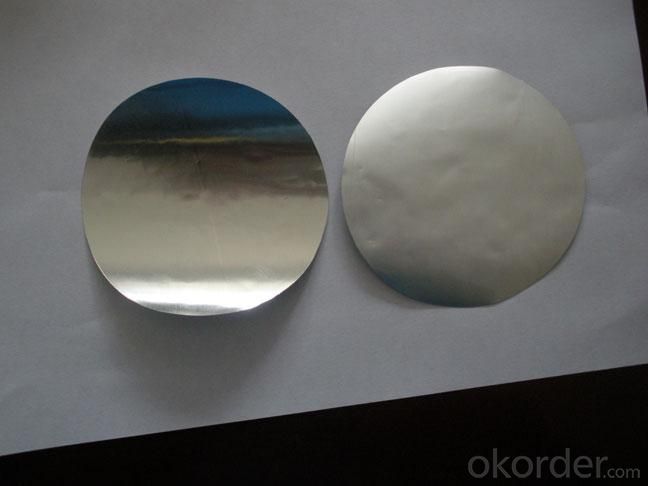
TYPICAL PHYSICAL PROPERTIES
PROPERTIES | METRIC | ENGLISH | TEST METHOD |
Backing Thickness | 50 Micron | 2.0 Mil | PSTC-133 / ASTM D 3652 |
Total Thickness | 90 Micron | 3.6 Mil | PSTC-133 / ASTM D 3652 |
Adhesion to Steel | 20 N/25mm | 72 Oz./In. | PSTC-101 / ASTM D 3330 |
Tack Rolling Ball | 15 cm | 6.0 In. | PSTC-6 / ASTM D 3121 |
Tensile Strength | 75 N/25mm | 17.0 Lb/In | PSTC-131 / ASTM D 3759 |
Elongation % | 3.5 | 3.5 | PSTC-131 / ASTM D 3759 |
Service Temperature | -30 ~ +120 °C | -22 ~ +248 °F | ------------ |
Applying Temperature | +10 ~ 40 °C | +50 ~ +105 °F | ------------ |
TYPICAL APPLICATIONS: HVAC industry for joining and sealing Foil-Scrim-Kraft Facing laminated fiberglass blanket / duct board joints and seams; joining and sealing flexible air duct seams and connections. General purpose holding, patching, sealing and masking applications – indoors and outdoors.
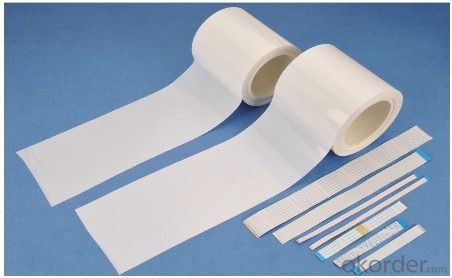
Aluminium tape FORM & SIZE AVAILABLE
Cut Roll: 48 / 50mm (2") / 60 / 63mm (2.5") / 72 / 75mm (3") / 96mm / 100mm (4").
Log Roll: 1200mm x 45 / 50m
Jumbo Roll: 1200mm x 1000m / 1200m
STORAGE & SHELF LIFE: 12 months when stored at 21°C (70°F) / 50% relative humidity out of direct sunlight.
SURFACE PREPARATION: It is essential, as with all pressure-sensitive tapes, that the surface to which the tape is applied must be clean, dry, and free of grease, oil or other contaminants.
PRODUCT USE: It is essential that the user evaluate the product to determine whether it is fit for a particular purpose and user’s method of application. Good results will be obtained when applied to a clean, dry surface with a suitable pressure on product between +10 ~ +40°C (+50 ~ +105 °F).
- Q: What is the coefficient of friction for aluminum sheets?
- The coefficient of friction for aluminum sheets can vary depending on the specific conditions and surfaces involved.
- Q: Are aluminum sheets suitable for signage?
- Signage can greatly benefit from the use of aluminum sheets. This material is known for its versatility and numerous advantages when it comes to signage applications. With its lightweight nature, durability, and resistance to corrosion, aluminum is an excellent choice for both indoor and outdoor signage. Regardless of weather conditions, be it rain, snow, or intense UV exposure, aluminum sheets will not deteriorate or fade. Furthermore, aluminum sheets are easy to work with, providing a wide range of customization options such as embossing, engraving, and digital printing. Not only are they cost-effective, but they also have a long lifespan, ensuring that signage remains in top-notch condition for extended periods. Ultimately, due to their durability, versatility, and aesthetic appeal, aluminum sheets are a preferred choice for signage.
- Q: Explain how the use of aluminum sheets can impact the energy efficiency of a building.
- <p>Aluminum sheets can significantly affect a building's energy efficiency due to their excellent thermal conductivity and reflective properties. They can be used in building construction to form a barrier against heat transfer, reducing the need for heating and cooling. Additionally, aluminum's reflective surface can help in reflecting sunlight, thereby reducing heat gain in the building. However, if not properly insulated, aluminum's high conductivity can lead to heat loss, reducing energy efficiency. Therefore, the use of aluminum sheets in buildings often requires a balance between their heat-reflective and heat-conductive properties to optimize energy efficiency.</p>
- Q: Can the aluminum sheets be used for manufacturing chemical piping systems?
- Yes, aluminum sheets can be used for manufacturing chemical piping systems. Aluminum is known for its excellent corrosion resistance, which makes it suitable for handling various chemicals. It is also lightweight, making installation and maintenance easier. Additionally, aluminum has good thermal conductivity, allowing for efficient heat transfer in chemical processes. However, it is important to consider the specific requirements of the chemicals being transported and consult with experts to ensure that the aluminum sheets chosen have the necessary properties and are compatible with the chemicals to be used in the piping system.
- Q: What is the minimum bending radius for aluminum sheets?
- The minimum bending radius for aluminum sheets depends on several factors, including the thickness and alloy of the sheet, as well as the bending method being used. However, as a general guideline, the minimum bending radius for aluminum sheets is typically around 1.5 to 2 times the thickness of the sheet. For example, if you have a 1mm thick aluminum sheet, the minimum bending radius would be around 1.5 to 2mm. It is important to note that these values can vary, so it is always recommended to consult the specific material and bending guidelines provided by the manufacturer or a professional in the field to ensure optimal results.
- Q: Can aluminum sheets be polished?
- Yes, aluminum sheets can be polished. Aluminum is a relatively soft metal, which makes it easier to polish compared to harder metals like stainless steel. Polishing aluminum sheets involves using abrasive materials such as sandpaper or polishing compounds to remove any imperfections, scratches, or oxidation on the surface. The process typically involves several stages of polishing with different grits of sandpaper or polishing compounds, gradually achieving a smoother and more reflective surface. Polished aluminum sheets are commonly used in various applications, including automotive parts, architectural elements, and decorative items, as the polishing process enhances the metal's appearance and provides a lustrous and reflective finish.
- Q: Can aluminum sheets be used for industrial shelving?
- Certainly, industrial shelving can indeed make use of aluminum sheets. Aluminum, being a material that is lightweight and durable, offers numerous benefits for industrial shelving applications. It possesses resistance against corrosion, making it suitable for environments that face exposure to moisture or harsh chemicals. Moreover, the strength-to-weight ratio of aluminum proves advantageous, enabling the creation of robust shelves capable of supporting heavy loads while remaining relatively light in weight. Furthermore, aluminum is low-maintenance as it does not necessitate painting or sealing like other metals. Consequently, aluminum sheets are an incredibly practical option for industrial shelving due to their durability, resistance to corrosion, and lightweight characteristics.
- Q: This question asks for the various dimensions in which aluminum sheets can be obtained.
- <p>Aluminum sheets are available in a variety of sizes depending on the manufacturer and the specific application. Common sizes include 12x12 inches, 24x24 inches, 4x8 feet, and 4x10 feet. Thickness can range from 0.010 inches (0.25 mm) for thin sheets to 0.5 inches (12.7 mm) for thicker plates. Custom sizes can also be ordered, and the availability of these sizes may vary by supplier. It's important to check with the specific supplier for the exact sizes they offer, as options can differ.</p>
- Q: Are the aluminum sheets suitable for manufacturing heat exchanger tubes?
- Yes, aluminum sheets are suitable for manufacturing heat exchanger tubes. Aluminum has excellent thermal conductivity, corrosion resistance, and is lightweight, making it an ideal material for heat transfer applications.
- Q: Can aluminum sheet be used for electrical grounding applications?
- Indeed, aluminum sheet finds utility in electrical grounding applications. It possesses remarkable conductive properties, rendering it apt for employment in grounding systems. Its low resistance and exceptional electrical conductivity make it a common choice in diverse electrical applications. With the capability to proficiently transport electrical current and securely disperse it into the ground, aluminum sheet guarantees the safeguarding of electrical systems and averts potential electrical dangers. Moreover, the lightweight and corrosion-resistant attributes of aluminum establish it as a favored option for grounding applications across numerous industries, encompassing construction, automotive, and aerospace.
Send your message to us
Aluminum Foil Tape HAVC Solvent Insulation Self Adhesive Repair Roofing
- Loading Port:
- Shanghai
- Payment Terms:
- TT OR LC
- Min Order Qty:
- 5 m.t.
- Supply Capability:
- 9000 m.t./month
OKorder Service Pledge
OKorder Financial Service
Similar products
Hot products
Hot Searches
Related keywords
